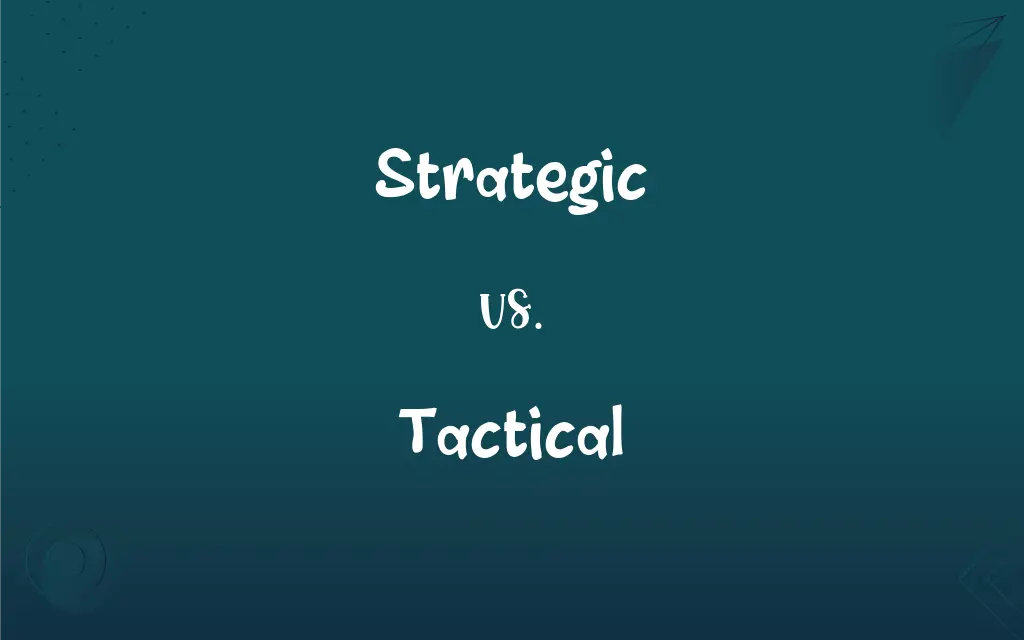Strategic vs. Tactical: What's the Difference?
Edited by Aimie Carlson || By Harlon Moss || Published on November 19, 2023
Strategic refers to focused on long-term goals and overall vision. Tactical refers to concentrated on short-term actions and immediate results.

Key Differences
Strategic thinking involves planning and decision-making that shapes the long-term direction and objectives of an organization. It's about setting overarching goals and determining the best path to achieve them. Tactical thinking, in contrast, is concerned with the immediate actions and steps required to implement strategies or achieve short-term objectives.
Strategic considerations often involve understanding the broader context, including market trends, competitive landscape, and long-term opportunities or threats. Tactical considerations are more about addressing immediate challenges, optimizing current processes, and making decisions that affect the short-term functioning.
Strategic plans are typically more comprehensive, addressing the 'why' and 'what' of an organization’s direction. They often require a higher level of abstraction and forward-thinking. Tactical plans, on the other hand, focus on the 'how' and 'when,' detailing specific actions, timelines, and responsibilities.
Strategic decisions often require input from senior management or leaders, as they can significantly impact the organization's future. They are more about setting priorities and allocating resources for long-term success. Tactical decisions are usually made at lower levels of management, focusing on efficiently executing strategic plans and adapting to immediate operational challenges.
Strategic planning is typically less detailed but broad in scope, providing a guiding framework for organizational growth and development. Tactical planning is more detailed and specific, aimed at achieving operational effectiveness and immediate objectives within the strategic framework.
ADVERTISEMENT
Comparison Chart
Focus
Long-term goals, overall vision
Short-term actions, immediate results
Planning Scope
Broad, comprehensive
Detailed, specific
Decision Level
Senior management, higher-level
Lower-level management, operational
Purpose
Setting direction, priorities
Executing plans, addressing challenges
Timeframe
Long-term, future-oriented
Short-term, immediate
ADVERTISEMENT
Strategic and Tactical Definitions
Strategic
Relating to long-term planning.
The company’s strategic plan focuses on expanding into new markets.
Tactical
Relating to immediate actions.
The team devised tactical solutions to resolve the production issue.
Strategic
Involving high-level decision-making.
The CEO played a strategic role in the company’s turnaround.
Tactical
Focused on short-term objectives.
The marketing campaign used tactical promotions to boost sales.
Strategic
Concerning the broader perspective.
They adopted a strategic approach to address environmental sustainability.
Tactical
Aimed at immediate results.
Their tactical response effectively handled the unexpected demand surge.
Strategic
Aimed at achieving major goals.
Their strategic investments significantly boosted the startup's growth.
Tactical
Involving specific maneuvers.
The manager’s tactical decision helped avert a crisis.
Strategic
Focused on overall objectives.
The strategic importance of customer satisfaction was emphasized.
Tactical
Concerned with day-to-day operations.
Tactical planning ensured smooth workflow during the peak season.
Strategic
Of or relating to strategy.
Tactical
Relating to, using, or involving tactics, especially in military or naval operations, and often in contrast to strategy.
Strategic
Important or essential in relation to a plan of action
A strategic withdrawal.
Tactical
Characterized by adroitness, ingenuity, or skill.
FAQs
Can strategic and tactical approaches be used together?
Yes, they are often used together; strategic sets the direction, while tactical handles the implementation.
Can a tactical approach influence strategic planning?
Yes, tactical outcomes and insights can influence and inform strategic planning.
Is it possible for tactical plans to change frequently?
Yes, tactical plans can change frequently in response to immediate operational needs.
Do startups need both strategic and tactical planning?
Yes, startups benefit from both strategic direction and tactical execution.
How does a company ensure alignment between strategic and tactical plans?
Alignment is ensured through clear communication, regular reviews, and consistent objectives.
What is the main difference between strategic and tactical?
The main difference is that strategic focuses on long-term goals, while tactical concentrates on immediate actions.
Can a tactical move have strategic implications?
Yes, sometimes a tactical move can have broader strategic implications.
Who typically makes strategic decisions?
Strategic decisions are typically made by senior management or leaders.
Are tactical decisions less important than strategic ones?
No, tactical decisions are not less important; they are crucial for executing strategic plans effectively.
Is tactical planning more detailed than strategic planning?
Yes, tactical planning is generally more detailed, focusing on specific actions and steps.
Can a strategic plan be successful without tactical execution?
No, strategic plans require effective tactical execution to be successful.
How specific are strategic objectives compared to tactical ones?
Strategic objectives are generally broader, while tactical objectives are more specific.
Can a tactical success lead to strategic reevaluation?
Yes, a tactical success can prompt a reevaluation of strategic plans.
Is experience important for making strategic decisions?
Yes, experience often plays a significant role in making informed strategic decisions.
Are tactical plans easier to modify than strategic plans?
Yes, tactical plans are generally easier to modify due to their short-term nature.
Can tactical failures impact strategic goals?
Yes, tactical failures can impact the achievement of strategic goals.
Is it necessary for all employees to understand both strategic and tactical plans?
Understanding both is beneficial, but employees are typically more involved in tactical execution.
How often should strategic plans be revisited?
Strategic plans should be revisited periodically to ensure alignment with changing circumstances.
Are tactical decisions made on a daily basis?
Yes, tactical decisions are often made daily to address operational challenges.
How far into the future do strategic plans typically look?
Strategic plans often look several years into the future, sometimes even decades.
About Author
Written by
Harlon MossHarlon is a seasoned quality moderator and accomplished content writer for Difference Wiki. An alumnus of the prestigious University of California, he earned his degree in Computer Science. Leveraging his academic background, Harlon brings a meticulous and informed perspective to his work, ensuring content accuracy and excellence.
Edited by
Aimie CarlsonAimie Carlson, holding a master's degree in English literature, is a fervent English language enthusiast. She lends her writing talents to Difference Wiki, a prominent website that specializes in comparisons, offering readers insightful analyses that both captivate and inform.






































































